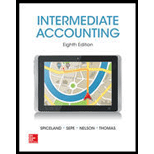
Intermediate Accounting w/ Annual Report; Connect Access Card
8th Edition
ISBN: 9781259546860
Author: J. David Spiceland
Publisher: McGraw-Hill Education
expand_more
expand_more
format_list_bulleted
Textbook Question
Chapter 12, Problem 12.4Q
When a debt investment is acquired to be held for an unspecified period of time as opposed to being held to maturity, it is reported at the fair value of the investment securities on the reporting date. Why?
Expert Solution & Answer
Want to see the full answer?
Check out a sample textbook solution
Students have asked these similar questions
Please provide the accurate answer to this general accounting problem using valid techniques.
Please help me solve this general accounting problem with the correct financial process.
Accounting?
Chapter 12 Solutions
Intermediate Accounting w/ Annual Report; Connect Access Card
Ch. 12 - Prob. 12.1QCh. 12 - When market rates of interest rise after a...Ch. 12 - Does GAAP distinguish between fair values that are...Ch. 12 - When a debt investment is acquired to be held for...Ch. 12 - Prob. 12.5QCh. 12 - What is comprehensive income? Its composition...Ch. 12 - Why are holding gains and losses treated...Ch. 12 - Prob. 12.8QCh. 12 - Prob. 12.9QCh. 12 - Prob. 12.10Q
Ch. 12 - Prob. 12.11QCh. 12 - Prob. 12.12QCh. 12 - Do U.S. GAAP and IFRS differ in the amount of...Ch. 12 - Under what circumstances is the equity method used...Ch. 12 - The equity method has been referred to as a...Ch. 12 - In the application of the equity method, how...Ch. 12 - Prob. 12.17QCh. 12 - Prob. 12.18QCh. 12 - Prob. 12.19QCh. 12 - How does IFRS differ from U.S. GAAP with respect...Ch. 12 - What is the effect of a company electing the fair...Ch. 12 - Define a financial instrument. Provide three...Ch. 12 - Some financial instruments are called derivatives....Ch. 12 - Prob. 12.24QCh. 12 - Prob. 12.25QCh. 12 - Prob. 12.26QCh. 12 - (Based on Appendix 12B) Reporting an investment at...Ch. 12 - Prob. 12.28QCh. 12 - Explain how the CECL model (introduced in ASU No....Ch. 12 - Prob. 12.1BECh. 12 - Prob. 12.2BECh. 12 - Available -for-sale securities LO12-4 SL...Ch. 12 - Prob. 12.4BECh. 12 - Prob. 12.5BECh. 12 - Prob. 12.6BECh. 12 - Prob. 12.7BECh. 12 - Prob. 12.8BECh. 12 - Prob. 12.9BECh. 12 - Prob. 12.10BECh. 12 - Prob. 12.11BECh. 12 - Prob. 12.12BECh. 12 - Prob. 12.13BECh. 12 - Prob. 12.14BECh. 12 - Prob. 12.15BECh. 12 - Prob. 12.16BECh. 12 - Prob. 12.17BECh. 12 - Prob. 12.18BECh. 12 - Prob. 12.1ECh. 12 - Prob. 12.2ECh. 12 - Prob. 12.3ECh. 12 - Prob. 12.4ECh. 12 - Prob. 12.5ECh. 12 - Prob. 12.6ECh. 12 - Prob. 12.7ECh. 12 - Prob. 12.8ECh. 12 - Prob. 12.9ECh. 12 - Prob. 12.10ECh. 12 - Prob. 12.11ECh. 12 - Prob. 12.12ECh. 12 - Prob. 12.13ECh. 12 - Prob. 12.14ECh. 12 - Prob. 12.15ECh. 12 - Prob. 12.16ECh. 12 - Prob. 12.17ECh. 12 - Prob. 12.18ECh. 12 - Prob. 12.19ECh. 12 - Prob. 12.20ECh. 12 - Prob. 12.21ECh. 12 - Prob. 12.22ECh. 12 - Prob. 12.23ECh. 12 - Prob. 12.24ECh. 12 - Prob. 12.25ECh. 12 - Prob. 12.26ECh. 12 - Prob. 12.27ECh. 12 - Prob. 12.28ECh. 12 - Prob. 12.29ECh. 12 - Prob. 12.30ECh. 12 - Prob. 12.31ECh. 12 - Prob. 1CPACh. 12 - Prob. 2CPACh. 12 - Prob. 3CPACh. 12 - Prob. 4CPACh. 12 - Prob. 5CPACh. 12 - Prob. 6CPACh. 12 - Prob. 7CPACh. 12 - Prob. 8CPACh. 12 - Prob. 9CPACh. 12 - Prob. 10CPACh. 12 - Prob. 11CPACh. 12 - Prob. 12CPACh. 12 - Prob. 13CPACh. 12 - Prob. 1CMACh. 12 - Prob. 2CMACh. 12 - Prob. 3CMACh. 12 - Prob. 12.1PCh. 12 - Prob. 12.2PCh. 12 - Prob. 12.3PCh. 12 - Prob. 12.4PCh. 12 - Prob. 12.5PCh. 12 - Prob. 12.6PCh. 12 - Prob. 12.7PCh. 12 - Prob. 12.8PCh. 12 - Prob. 12.9PCh. 12 - Prob. 12.10PCh. 12 - Prob. 12.11PCh. 12 - Prob. 12.12PCh. 12 - Prob. 12.13PCh. 12 - P 12–14
Classifying investments
LO12–1 through...Ch. 12 - Prob. 12.15PCh. 12 - Prob. 12.16PCh. 12 - Prob. 12.17PCh. 12 - Prob. 12.18PCh. 12 - Prob. 12.1BYPCh. 12 - Prob. 12.2BYPCh. 12 - Case 12–4
Accounting for debt and equity...Ch. 12 - Prob. 12.6BYPCh. 12 - Prob. 12.7BYP
Knowledge Booster
Learn more about
Need a deep-dive on the concept behind this application? Look no further. Learn more about this topic, accounting and related others by exploring similar questions and additional content below.Similar questions
- Can you solve this general accounting problem using accurate calculation methods?arrow_forwardPlease explain the solution to this general accounting problem using the correct accounting principles.arrow_forwardGoodwill is an example of an indefinite-life intangible asset, meaning that public companies must test it for impairment rather than regularly amortizing to systematically reduce its value on the balance sheet of the public company. Can anyone recap the difference between limited-life versus indefinite-life intangible assets? Any specific examples of either category?arrow_forward
arrow_back_ios
SEE MORE QUESTIONS
arrow_forward_ios
Recommended textbooks for you
 Intermediate Accounting: Reporting And AnalysisAccountingISBN:9781337788281Author:James M. Wahlen, Jefferson P. Jones, Donald PagachPublisher:Cengage Learning
Intermediate Accounting: Reporting And AnalysisAccountingISBN:9781337788281Author:James M. Wahlen, Jefferson P. Jones, Donald PagachPublisher:Cengage Learning

Intermediate Accounting: Reporting And Analysis
Accounting
ISBN:9781337788281
Author:James M. Wahlen, Jefferson P. Jones, Donald Pagach
Publisher:Cengage Learning

Financial instruments products; Author: fi-compass;https://www.youtube.com/watch?v=gvxozM3TUIg;License: Standard Youtube License